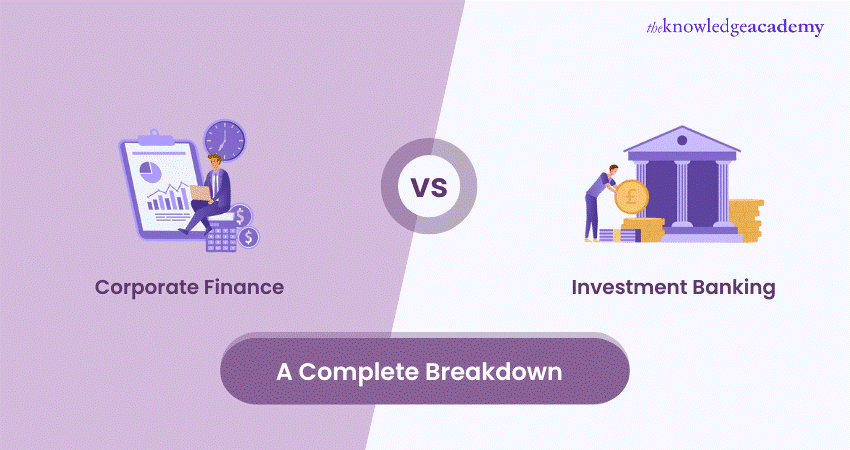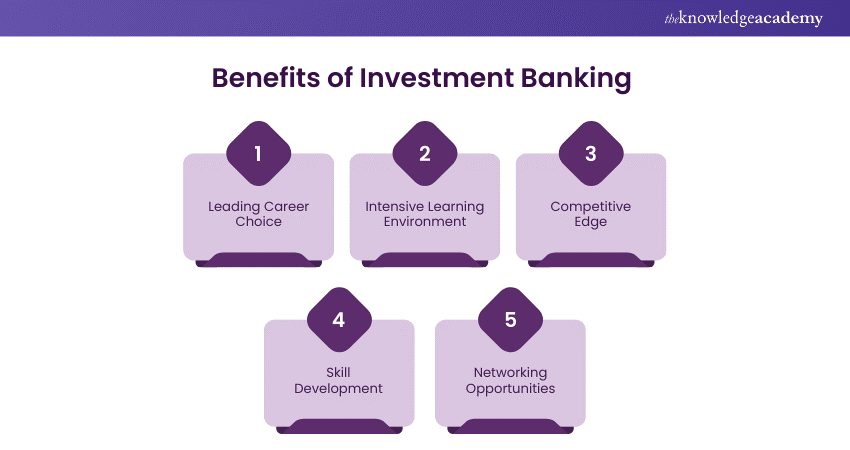We may not have the course you’re looking for. If you enquire or give us a call on 01344203999 and speak to our training experts, we may still be able to help with your training requirements.
We ensure quality, budget-alignment, and timely delivery by our expert instructors.

Do you want to proceed with your finance career but are still determining the right direction? Corporate Finance and Investment Banking are two significant areas that offer distinct opportunities. Corporate Finance involves handling a company's financial operations, including budgeting, overseeing, and risk assessment. Conversely, Investment Banking focuses on external activities like mergers, acquisitions, and raising capital. Both fields are essential in finance, and understanding their differences is crucial for making an informed decision. This guide will help you with details on Corporate Finance vs Investment Banking.
Table of Contents
1) Understanding Corporate Finance
2) Understanding Investment Banking
3) Differences Between Corporate Finance vs. Investment Banking
4) Conclusion
Understanding Corporate Finance
Corporate Finance involves various tasks aimed at guaranteeing a company's continued financial prosperity. It handles all aspects of obtaining funding, managing investments, and improving capital structure, thus guaranteeing a positive capital return. The main goal is to improve shareholder value and grow wealth through the responsible issuing of financial resources.
Corporate Finance encompasses a variety of actions aimed at securing a company's financial well-being and expansion. Detailed planning and analysis are required to boost financial performance through budgeting, forecasting, and financial reporting. Engaging in these activities enables companies to measure their financial status, pinpoint areas for reducing expenses, and assess possible investment options.
Corporate Finance plays an essential role in achieving long-term success by aligning financial strategies with the company's overall objectives. It also places focus on risk management, pinpointing possible financial risks and creating plans to reduce them, guaranteeing the company is ready for any financial obstacles.
Finance Managers are essential in this process as they provide advice on capital investments. It also determines the best capital structure and decides whether to reinvest profits back into the business or distribute them as dividends to shareholders. This strategic approach aids the company in growing and improves its financial worth.
Finance Managers play an important role in Corporate Finance by leading crucial decisions that influence the company's financial outlook. They evaluate market patterns, assess the financial feasibility of projects, and advise the optimal allocation of resources. This involves determining capital spending choices, like purchasing new assets or technology.
Additionally, they assess the financial well-being of the company and suggest plans for improving cash flow and profitability. Finance Managers play a key role in maintaining the company's competitive advantage in the market. All this is done through carefully managing of both immediate financial requirements and long-term growth plans.
Benefits of Corporate Finance
Corporate Finance offers various advantages in the financial industry. Explore the benefits of Corporate Finance here:
1) High Median Salary: Many roles in Corporate Finance are in the higher-earning categories of the financial sector.
2) Appealing Perks and Benefits: Workers frequently receive quality perks and benefits packages.
3) Plentiful Growth Opportunities: This industry has many chances for career progression.
4) Different Types of Career Positions: Corporate Finance provides a broader selection of roles than Investment Banking, which allows for a more suitable match with one's skills and interests.
5) Increased Job Opportunities: Typically, there are more positions in Corporate Finance, making it easier to land a job compared to the highly competitive field of Investment Banking.
6) Improved Equilibrium Between Work and Personal Life: Although work schedules may differ, they are usually easier to handle than those in Investment Banking.
Drawbacks Corporate Finance
Let’s examine the drawbacks of corporate finance in terms of compensation levels, qualifications, and more.
1) Requirements of Higher Education: Certain positions may demand a Master's Degree or appropriate certifications, rendering the field highly competitive.
2) Comparative Salary Levels: Although they still offer good pay, most jobs in other industries typically do not provide the same salary as positions in Investment Banking. However, there is a potential for higher pay with established companies.
3) Limited Recognition: Corporate financial analysts often need help to spot in terms of recognition compared to Investment Bankers.
Enhance your Business skills and start your journey with Corporate Finance Training- today!
Understanding Investment Banking
Investment Banks aid businesses in raising capital by releasing securities in markets. They also guide businesses through acquisitions and mergers and perform complex financial analyses to serve their clients with assets.
It comes under a banking division that allows security issuers to go public when raising funds. It contains sectors with underwriting tasks. In the context of Asset Management vs Investment Banking, investment banking is a subset of corporate finance within a finance department.
Benefits of Investment Banking
Let’s explore the benefits of Investment Banking to reveal the career advancement opportunities and compensation levels:

1) Leading Career Choice: Investment Banking is one of the most demanding career options among candidates. It offers industry recognition with impressive perks.
2) Intensive Learning Environment: Entry-level analysts may find it challenging. However, after getting some experience, you can advance to top positions.
3) Competitive Edge: It is ideal for individuals with solid negotiation skills, the ability to handle high pressure and peak financial knowledge.
4) Skill Development: It provides a sharp learning curve and the development of strategic thinking and financial analysis.
5) Networking Opportunities: Investment Banking enables experts to create a strong network with clients, industry experts, and senior executives.
Drawbacks of Investment Banking
Investment Banking comes with some disadvantages. Let’s understand the drawbacks of Investment Banking here:
1) Job Market Decline: The 2008 global financial crisis is responsible for the job market's decline. However, it's a very popular field, and new hires are always welcomed.
2) High Attrition Rates: Entry-level analysts often leave their jobs in the first few months because of the intense work pressure.
3) Long Working Hours: An Investment Banker is required to give 75-100 hours of work per week. This could lead to a job dent.
Master the market with our Investment Banking Training Course—Sign up now!
Differences Between Corporate Finance Vs. Investment Banking
Understanding Corporate Finance vs Investment Banking is the key to going through the distinct roles within the financial sector.

1) Documentation Process
Corporate Finance professionals craft crucial financial reports, like balance sheets and various financial statements, for their companies. At the same time, Investment Bankers are tasked with developing portfolios, pitch books, and memorandums.
2) Overall Purpose
Corporate Finance and Investment Banking have different goals and purposes. Investment Banking specialises in helping companies obtain capital through activities like mergers and acquisitions and the sale of securities. On the other hand, Corporate Finance helps companies obtain funding and efficiently manage their assets.
3) Type of Work
Investment banking, which is part of Corporate Finance, encompasses specific responsibilities. Corporate Finance is dedicated to obtaining funds for business expansion and integration, whereas Investment Banking is centred on fulfilling particular investment requirements such as mergers, acquisitions, and securities issuing. The industry is renowned for its high level of expertise and fierce rivalry.
4) Career Outlook
The number of positions in Investment Banking typically stays consistent each year because of the intense competition within the industry. In Corporate Finance, many job opportunities are available for candidates with just a bachelor's degree and some years of relevant experience.
Employers in Investment Banking frequently seek candidates with extra training and education. It trains only a limited number of individuals annually for these roles.
5) Employment Opportunities
Corporate Finance offers different roles; however, Investment Banking has fewer positions available. Because of this, Investment Banking demands candidates with pre-defined skills and proper certification.
6) Roles and Responsibilities
Corporate Finance roles include Financial Analysts, CFOs, and Benefits Managers. Investment Banking roles include private equity, business analysts, associates, and Investment Banking analysts.
|
Aspect |
Corporate Finance |
Investment Banking |
|
Documentation Process |
Balance sheets, income statements, cash flow statements. |
Pitch books, financial models, memorandums. |
|
Overall Purpose |
Manage assets, secure funds for growth. |
Raise capital through securities, M&A. |
|
Type of Work |
Budgeting, forecasting, financial analysis. |
M&A, securities issuance, client advisement. |
|
Career Outlook |
Steady growth, bachelor's degree sufficient. |
Competitive, advanced degrees often required. |
|
Employment Opportunities |
Diverse roles, easier to find positions. |
Specialised roles, intense competition. |
|
Roles and Responsibilities |
Financial Analysts, CFOs, Controllers, internal focus. |
Analysts, Associates, client-focused financial activities. |
Conclusion
We hope you grasp the difference between Corporate Finance vs Investment Banking. These two distinct career paths offer a balanced work-life with some added benefits, and becoming an Investment Banker can offer unique challenges and rewards. Consider your career aspirations and interests when picking between these fields. Since both offer thrilling and fulfilling opportunities, you get to encounter challenges and reward.
Boost your profitability with our Revenue Management Training—Register now!
Frequently Asked Questions
What is the Difference Between Corporate Financial Analysis and Investment Financial Analysis?

Corporate Financial Analysis assesses a company’s financial health and focuses on optimising its performance. Investment Financial Analysis evaluate investments like bonds and stocks to make informed decisions.
What are the Three Main Areas of Corporate Finance?

The three main areas are:
1) Handle long-term Investment projects
2) Optimise both debt and equity financing
3) Ensuring enough liquidity for operations
What are the Four Areas of Investment Banking?

The four areas of Investment Banking are:
1) Advising on strategic transitions
2) Issue securities to increase capital
3) Buy and sell securities for clients
4) Handle Investment portfolio for clients
What are the Other Resources and Offers Provided by The Knowledge Academy?

The Knowledge Academy takes global learning to new heights, offering over 3,000 online courses across 490+ locations in 190+ countries. This expansive reach ensures accessibility and convenience for learners worldwide.
Alongside our diverse Online Course Catalogue, encompassing 19 major categories, we go the extra mile by providing a plethora of free educational Online Resources like News updates, Blogs, videos, webinars, and interview questions. Tailoring learning experiences further, professionals can maximise value with customisable Course Bundles of TKA.
What is the Knowledge Pass, and How Does it Work?

The Knowledge Academy’s Knowledge Pass, a prepaid voucher, adds another layer of flexibility, allowing course bookings over a 12-month period. Join us on a journey where education knows no bounds.
What are the Related Courses and Blogs Provided by The Knowledge Academy?

The Knowledge Academy offers various Accounting & Finance Training, including the Corporate Finance Training, Revenue Management Training, and Investment Management Course. These courses cater to different skill levels and provide comprehensive insights into How to Become a CFO.
Our Business Skills Blogs cover a range of topics related to Business, offering valuable resources, best practices, and industry insights. Whether you are a beginner or looking to advance your Business Skills, The Knowledge Academy's diverse courses and informative blogs have got you covered.
Upcoming Accounting and Finance Resources Batches & Dates
Date
 Corporate Finance Training
Corporate Finance Training
Fri 4th Apr 2025
Fri 6th Jun 2025
Fri 8th Aug 2025
Fri 3rd Oct 2025
Fri 5th Dec 2025






 Top Rated Course
Top Rated Course



 If you wish to make any changes to your course, please
If you wish to make any changes to your course, please


